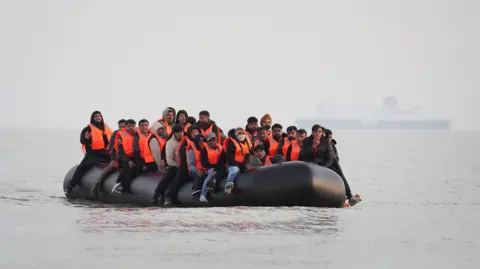‘One in, one out’ sounds simple – but the migrant deal could be complicated
60 minutes agoMark EastonHome editor•@BBCMarkEaston

 Reuters
ReutersThe returns deal is designed as a deterrent to stop the boats. But the announcement of a pilot for a ‘one-in-one-out’ scheme is just the first step in what could be a very complicated process.
The plan proposes that for each migrant the UK returns to France, another migrant with a strong case for asylum in Britain will come the other way. The Home Office would not speculate on how many people would actually be expelled weekly, noting that the number may vary during the pilot stage of the scheme.
During a press conference Sir Keir Starmer gave with France’s President Emmanuel Macron this afternoon, the prime minister also would not be drawn into the details, and said discussing them could undermine “how this will operate”.
Details aside, the agreement is likely to encounter legal, political and practical obstacles, and the need to demonstrate ‘proof of concept’ will not be straightforward.
However, the legal principle behind the idea is broadly sound. The UN Refugee Convention does not allow migrants to choose where they claim asylum, so there is nothing necessarily unlawful about people being sent from Britain to France for processing.
The previous government’s Rwanda scheme struggled to get off the ground because the courts were persuaded the East African country was not safe enough to be compliant with the demands of the convention. France, however, would not raise such concerns.
Legal challenges are likely to be about the details of the process. Is the system of selection fair? What might happen to people when they reach France?

 PA Media
PA MediaOne political hurdle will be convincing EU member states that Britain’s migrants will not end up back in their territory. Information stored on the EU’s Eurodac asylum database, unavailable to Britain since Brexit, might be used to identify migrants who had previously claimed asylum in another European state.
As well as legal challenges regarding returning people to France, there may be practical difficulties in deciding which migrants in France should be sent to the UK. Who will make those decisions and on what basis?
Britain has long resisted the idea that asylum claims can be assessed beyond this country’s border, fearing such a facility would become a magnet for migrants seeking a new life across the Channel.
However, there is a precedent for a scheme to identify asylum seekers with a strong case for being awarded refugee status in the UK.
In 2002, Britain and France jointly worked on a plan to close the Sangatte camp of migrants trying to get to the UK. As part of that arrangement, the United Nations High Commissioner for Refugees (UNHCR) oversaw a registration process conducted by British officials in France, deciding which migrants should be given permission to pursue their asylum claim in Britain.
The details of every aspect of today’s Anglo-French arrangement will need to be tested. No wonder officials want the scheme to start small.
And will it work? It is very hard to comprehend how migrants balance the risks and opportunities when deciding whether or not to board a flimsy dinghy.
The pilot scheme being proposed is probably not at a large enough scale to act as a serious deterrent, but officials believe the arrangement has the potential to be a powerful weapon in the battle to stop the boats.
Even if the arrangement can be shown to work, there will then be questions about the cost and practicalities of scaling it up to a level that will make desperate migrants waiting in the Calais camps think again about attempting to cross the Channel.